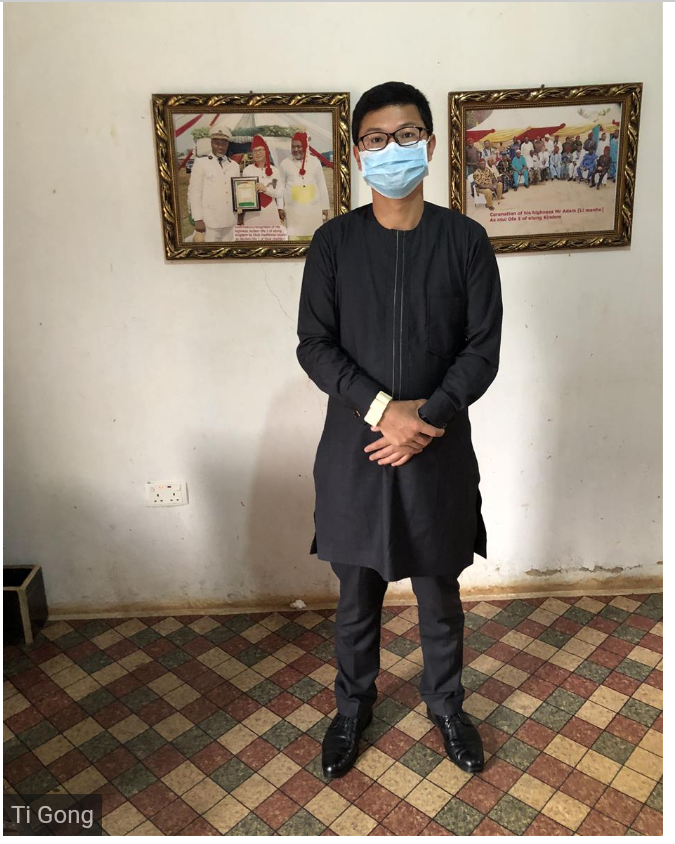With the expansion of Chinese-African cooperation over the last decade, Chinese enterprises have made significant investments in African infrastructure.
Many construction sites there have Chinese workers. The two peoples work and live together and have developed a close friendship. For their outstanding contributions, some Chinese people have even been named “chiefs” by African leaders.
Among all the Chinese who have been given the title of “chief” in Africa, Li Manhu stands out as a “Post-90s” figure.
He is not only the youngest known Chinese “chief,” but also the recipient of the Nigerian and Cameroonian “double chief” titles.
Li is only 30 years old, but he has worked in Africa for six years.
Why did he go to Africa? What contribution has he made to Africa earned him the title of “Double Chief”? What kind of special power does he have?
As the 8th FOCAC Ministerial Conference came to an end, a Shanghai Daily reporter reached out to this legendary millennial to learn more about his life.
Searching for the ‘African Dream’
Li is a typical young man who studies science and technology. He joined a state-owned enterprise to explore coal mining after graduating from university.
However, in his opinion, the concept of the “stable, life-long job” is meaningless.
“There is no point in living a life like this. So, despite my family’s strong opposition, I resigned from my job.”
After resigning, Li began to look for more “exciting” work and gave a curriculum to a mine in Nigeria.
The Nigerian company was very welcoming. After some English training, Li flew to Africa in 2015 with his dream in hand.
Nigeria is the most populous country in Africa and one of the African countries with the largest Chinese population. The local government works closely with China.
However, it wasn’t until he boarded the plane and flew for more than 10 hours that Li truly felt the vastness of Africa. He was dimly aware of the difficulties that lay ahead.
Nigeria has no winter, only rainy and dry seasons. “I went in January. It was the dry season; the local temperature was more than 30 degrees, but I was wearing a sweater. When I got off the plane, my only feeling was the heat.”
Li’s first job in Nigeria was to do mineral exploration, which entails living in a mining area for a year in miserable conditions.
There was no local signal, so “communication by shouting, traffic by walking” was his regular life. He also had to sleep in a room with four or more people while suffering from mosquito bites.
In just a few months, Li contracted malaria, developed a high fever, vomited, and suffered for several days. “At the time, I was remorseful for having come here. But when I got better, I forgot about it all and pretended it wasn’t a big deal.”
He said he never mentioned these things to his family, and when asked, his answer was always “It’s fine.”
After two years of training, Li joined China Overseas Group (CGCOC GROUP) in 2017 as the office director of the “Cross-border bridge between Nigeria and Cameroon” project.
He has over 200 African workers under him, and he must be concerned about their life, work, and safety. He is also in charge of paying their salaries at the end of each month.
And it was also this bridge project that laid the foundation for Li to earn the title of “Double Chief” later on down the road.
The ‘fortunate’ Chief I
According to Li Manhu, before the construction of the cross-border bridge, there was only a one-way old bridge connecting Nigeria and Cameroon, which frequently blocked traffic, whereas the construction of the cross-border bridge will greatly improve the two countries’ cross-border port traffic congestion, promoting trade and economic development between the two nations.
“The bridge was completed in April this year and is expected to be open to traffic next year,” Li exclaimed joyfully.
Throughout his career, Li has developed a close relationship with the local paramount ruler (the king). On the Christmas Eve of 2018, Li was invited by the leader of the Etung local government as a guest to his home, and as he was leaving, the leader told him that he was going to bestow upon him the title of chief.
The king informed Li that the cross-border bridge project had benefited the local community and that he had been appointed chief as a sign of local recognition of the company, and that he would be representing the king in some of the company’s future dealings with the local people.
“The chieftaincy title is not only a personal honor but also represents the respect and recognition of the local people for the company’s projects,” said Li. “In Africa, only foreigners who have made outstanding contributions to the local economy and social development can be awarded the chieftaincy title.”
It should be noted that although Nigeria has a modern administrative system, chiefs, as traditional tribal leaders, still enjoy high prestige among the population and are also highly respected by the government, which even consults with local chiefs before making major decisions.
